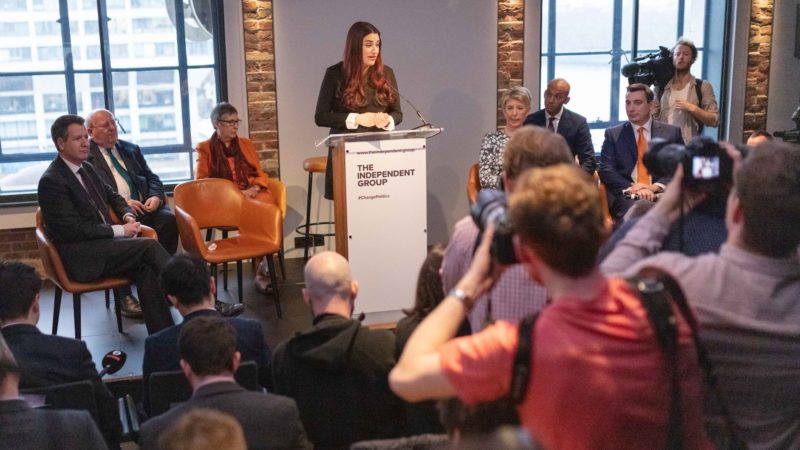
At the Fabian Society’s New Year conference, I asked Tom Watson how his views on electoral reform have developed. Tom, who is now “agnostic” about change, told me and an audience that the real question is whether we can “find it within ourselves to be a big tent party”; one that brings together all the varying traditions of the labour movement. If we can’t, he said, we “need a political system that allows those voices to be expressed in different entities under a different electoral system”.
Since then, eight Labour MPs decisively answered Tom’s question by resigning to set up The Independent Group (TIG). Later joined by three Conservatives, the group has now started the process of registering to become a new political party called “Change UK” – and we should expect to face them in a general election sooner or later.
Members can argue about just how left-wing these former Labour MPs really are, and whose fault it is that they quit. But that would be to miss a crucial point: if Labour is to win under our first-past-the-post (FPTP) voting system, we must be an all-encompassing progressive party. History and electoral arithmetic tells us that splits are generally catastrophic for the Labour Party and – more importantly – for the people we represent.
The consequences of Labour splits under FPTP
The last time Labour suffered a major split was in 1981, when the Gang of Four broke away to become the Social Democratic Party. In the 1983 general election, the SDP, in alliance with the Liberals, took a quarter of all votes cast and barely made a dent on the Commons – securing just 3.5% of seats. But the impact of this on the rest of parliament was disastrous: it cut into our representation and handed the Conservatives a landslide majority even though they lost votes.
Something similar happened in New Zealand before it replaced FPTP with a system of proportional representation. In 1989, MP Jim Anderton led a break away left-wing alternative to the NZ Labour Party. In the next election, the new party won just a single seat but, by splitting the Labour vote, it was a factor in helping New Zealand’s conservative “National” party win almost 70% of parliamentary seats.
This is what’s known as “the spoiler effect” – one of the great ironies of first-past-the-post. When a new party stands in a two-party system, it divides the vote of whichever party it’s seen as having most in common with. Typically, the new party’s main impact is to strengthen whichever of the established parties its voters are most opposed to.
Who will the new party hurt the most?
Some will argue that a party that includes former Conservatives like Anna Soubry is as likely to split the Tory vote as it is the Labour vote. Well, even at face value, it’s important to remember the new party is eight parts Labour to three parts Tory.
More importantly, polling suggests that a sizeable proportion of Labour voters feel they now have more in common with TIG than with the Labour Party. In one poll, 23% of Labour voters said their values are closer to TIG than to Labour. A number of pollsters have tested voting intention both with and without the Independent Group listed as an option. The worrying thing is that in almost every case the TIG vote displaces more Labour voters than Conservative voters. In some cases, the polls indicate a 7% swing from Labour to TIG.
It may be difficult for some on the Labour left to imagine, but not everyone who voted for Blair did so through gritted teeth. Some voters really do feel best represented by the “right wing” of the Labour Party. We don’t know for certain how many of these voters there are, but we do know that – as Tom Watson suggested – we need them if we are to win a majority under FPTP. Even losing a tiny share of the national vote to a new party contesting this space would be enough to wipe out precarious Labour-held marginals, of which there are many following the 2017 election, and put our target seats out of reach.
We need proportional representation
It goes without saying that polls are not a reliable guide to the future at the best of times – and these are not the best of times. We are living through one of the most volatile periods in modern British history.
What we do know is that our primitive voting system responds erratically and irrationally when additional parties are introduced. We know FPTP can catapult the Conservatives into a landslide majority even as their public support falls, particularly when a new party contests the centre to centre-left ground. We know that when this last happened it was a disaster from which society has yet to recover.
We also know that in 14 of the last 15 general elections, most people have voted for parties to the left of the Conservatives. We know that if we had proportional representation, so that seats matched votes, this would be reflected in parliament. We know that countries with PR have more progressive government and achieve better socialist outcomes than those with FPTP.
Given these facts, each first-past-the-post election is a huge gamble. The next time we are in government, we will once again have to decide whether to bring in proportional representation or whether to go on gambling. With the stakes so high, why take the chance?




More from LabourList
Sadiq Khan signals he will stand for a fourth term as London Mayor
Starmer or Sarwar: Scottish Labour MSPs and MPs split over Keir Starmer’s future
‘Every Lidl helps: What can the Government do to bring down food prices?’